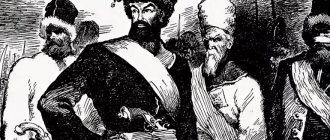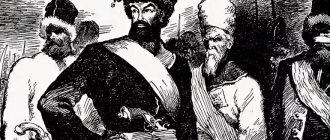You can show your pride as much as you want, but fate will take it into the arms of another.
***
Self-esteem should awaken before dirty and slippery affairs. Otherwise your pride will turn into lust and lies.
***
The best friend is mom. She never envyes, does not wish bad things. And love and pride for her child sparkles in her eyes!
***
“This is impossible,” said reason. “This is reckless,” observed experience. “This is senseless,” cut off pride.” Try it. " whispered the dream
***
Everything as usual. Fear pulls you back, curiosity pushes you forward, pride stops you. And only common sense nervously marks time and swears.
***
Every day I try to treat people the way they treat me. And every day I understand that kindness in me is stronger than pride.
***
Distance, a lot of problems, pride will not prevent you from being together... There is only one obstacle, the reluctance of one to love the other.
Statuses about pride
The two of us sat proudly and drank strong tea. And to everyone who lived in my heart, We said “Farewell!”
***
Love is always blind, Because there are no ideal people. And pride, which itself is stupid, gave me advice:
***
“Why forgive a loved one? If you make a mistake, send it away. And you need to look for the best, Without saving the thread. And if he was rude to you, don’t you dare run after him! And the fact that there is nothing more desirable than lips will pass, get over it!”
***
- Looking at the sunset with my beloved, And knowing the taste of happiness, Inhaling the aroma of love, I am only proud that we managed to preserve our bright love. Now there is peace in my heart. I chose to love!
***
Pride sat at the table with an arrogant, stern look, But even this table and the house were not happy for the Mistress.
***
It is easier for the proud; the proud do not cry, neither from wounds nor from mental pain. They don’t loom on other people’s roads, They don’t beg for love like beggars.
***
Their shoulders are spread wide, The scab does not oppress them with envy. It is true that life is easier for the proud. But it’s not easy to become proud.
***
- It's easier for the proud - the proud don't cry Only sometimes in the pillow at night They hide the rattle of pain and a tear And sometimes they cry at night
***
And it also happens very often: They cry with blood, body and soul. They don’t become proud from happiness. Pride is fear for one’s peace.
***
It seems that the word pride is not bad, up to conventional moral boundaries, and then, as if in a crooked mirror, we look and don’t even see faces.
***
Pride means joy for the success of loved ones and relatives. Joy for yourself is by no means goodness, but the desire to be better than others.
***
A feeling of superiority arises, or self-neglect grows. It will be far from nobility, but it will immediately lead to pride.
***
Pride is joy for someone, for one’s country, patriotism. Pride is neither a board of honor nor heartless selfishness.
***
- Only a madman or a psycho will ignore personal dignity. Pride and arrogance can argue, And dignity borders between them.
***
Pride has many excuses, All attention is only on yourself, The root of evil, the cause of all suffering, Loving pride too much.
***
Pride and arrogance hopelessly, Will forever argue among themselves, But then pride, imperceptibly, Can become secret pride.
Discourse on Pride and Humility
There are so many proud and arrogant people in the modern world. They surround us everywhere, from wealthy entrepreneurs to children of wealthy parents. Proud people have a very difficult and complex character, but sometimes their true colors are never revealed.
Pride is a feeling of one’s own exclusivity and superiority over others. A person believes that everyone should treat him in a special way, give him compliments, emphasize his exclusivity and good character traits.
A proud person does not tolerate criticism and disagreement. If you go deeper, you will notice that pride never lives alone. This vice brings friends with it.
Pride has a good relationship with egoism. A selfish person thinks only about his own benefit. He thinks about how to make all people work for him, his desires, dreams and applications. This category of people is prone to manipulation.
Egoists put pressure on other people. They absolutely do not care which way they get what they want. Egoists will go over their heads. True, there are those who do not want to harm others. They hurt others unknowingly.
Examples of such behavior are Evgeny Onegin and Grigory Pechorin. Both are selfish, but Onegin causes pain and discomfort to others unconsciously, while Pechorin does it intentionally.
Pride and arrogance disgust other people. They feel that they are treated as second class. Proud people often have power, knowledge, and special abilities. Very rarely is pride born out of the blue.
You need to be something to be proud of. However, there are those who are proud of such stupidity that those around them are amazed.
Humility is the opposite of pride and the only cure. To reconcile means to submit, to agree with people or circumstances, even if you don’t want to do it. Coming to terms is always difficult.
Humility puts others above oneself and places one in a position of submission rather than power. We can often notice that people who had great wealth, after ruin, went to monasteries and submitted to a higher authority.
They realized that there was someone above them who controlled everything. Their money, fame and power were temporary, and now they need to learn to live again. Live just like ordinary people. In this case, some become embittered, while others humble themselves.
Humility helps restore spirituality and follow the right and pure path. God Himself humbled himself to the point of death on the cross.
Statuses about pride
The two may not meet because of stupid pride. They will wait for the first step from each other. They themselves do not dare to act first - what if it is not mutual.
***
I want to talk to her, but it’s just like something is tying me hand and foot. The tongue seems to be paralyzed. I hate my pride.
***
- She kisses and hugs him in her dreams. But in reality, he cannot squeeze out the banal “hello.” And all because of pride.
***
If you understand that this is your person, step on the throat of your pride. Otherwise you will hate yourself later.
***
It’s easier for the proud, the proud don’t cry... neither from wounds, nor from heartache... they don’t loom on other people’s roads, for love, like beggars don’t beg
***
In order not to perish from loneliness, in order to increase the number of friends, reduce your “Highness” and moderate your “Majesty”!
***
Look around. We could be just as happy. But no, we have pride. Apologizing is so difficult.
***
- I'm proud only for those I don't care about And I don't give a fuck about pride for those I love
***
Well, I’m sorry that I’m not running after you like I was before, it’s just that my pride has returned from vacation =)
***
The highest approval of merit and merit consists in silent acceptance of them as due. – R. Emerson
***
Anyone who does not understand his purpose most often lacks self-esteem. – F. Dostoevsky
***
My life experience has convinced me that people who have no shortcomings have very few virtues. – A. Lincoln
***
- Too much dignity sometimes makes a person unsuitable for society: people don’t go to the market with gold bars; they need small change, especially small change. – N. Chamfort
***
Advantages, elevating you, humiliate others, while disadvantages, allowing others to laugh at you without malice, raise them in their own eyes. – A. Maurois
***
The dignity of every person depends only on how he shows himself in his actions. – A. Knigge
***
Our pride is often increased by the shortcomings we have overcome. – F. La Rochefoucauld
***
Every dignity, every strength is calm precisely because they are confident in themselves. – V. Belinsky
***
No matter how close to the shore the buoys are located, swimming beyond them makes you feel proud.
***
It is just as reasonable to pay tribute to your virtues in private as it is ridiculous to extol them in the presence of others. – F. La Rochefoucauld
***
***
Self-esteem develops only through the position of an independent owner - N. Chernyshevsky
***
He who maintains dignity in trouble teaches courage to worthy people and serves as a reproach to bad people. – W. Foscolo
***
We quickly notice the slightest advantages in ourselves and slowly discover shortcomings. – J. Labruyère
***
Judge a stranger's worth by his deeds; in deeds the fruits of even secret intentions are always revealed. – Hitopadesha
***
Truly extraordinary virtues are possessed by those who have managed to earn the praise of their envious people. – F. La Rochefoucauld
***
There is nothing more useful than a good name, and nothing creates it as firmly as dignity. – L. Vauvenargues
***
True dignity is like a river: the deeper it is, the less noise it makes. – M. Montaigne
***
The more we talk about our virtues, the less they believe in them. – N. Chernyshevsky
***
It only takes a moment to become a hero, but it takes a lifetime to become a worthy person. – P. Brula
***
If we were not overcome by pride, we would not complain about the pride of others. – F. La Rochefoucauld
How to learn pride
Accept yourself completely and forgive for the mistakes you have made. This is not so easy to achieve. But you can see yourself in a positive way and develop a noble character trait through the following principles:
- Form an opinion about yourself regardless of outside assessments. If you do not begin to evaluate yourself adequately with love and acceptance, then over time you will develop a dependence on the opinions of others.
- Don't let others tell you what to think and do. Don't try to change for someone else. It is important not to indulge someone else’s desires as a reproach to your own.
- Have personal moral principles. Never break them.
- Learn to manage your emotions, and also try not to destroy relationships with others by openly showing anger, resentment and rage.
- Don't talk badly about yourself, especially in company.
- Try to learn something new, open up opportunities and expand your horizons. The slightest achievements will have a positive impact on the feeling of pride in the knowledge acquired.
- Take full responsibility for your life, health and building relationships with your environment.
Statuses for the proud and brave
The older you get, the more you don’t care what they say and think about you.
***
I feel sorry for people who talk bad about me. After all, they are so flawed that they don’t even understand how much I don’t care about their opinion.
***
A strong person tries to correct his mistakes, while a weak person tries to justify them.
***
You can expect a fiance from the army, a husband from the war, a brother from school, a father from work, a son from school, but not a guy from a party. Remember this, dear girls, and do not forget to value yourself.
***
Take care of those around you, appreciate the one who forgot his pride for you, who forgave a lot and always waited. Fate sends us such people only once.
***
Everything will pass, believe and calm down. Don't ask fate for handouts. Nothing, my soul, do not be afraid. We're not out of the game yet.
***
Proud? Do not write? So please. Do not write. Choke on your pride. I will have a hundred more like you, the little girl said to the felt-tip pen.
***
If your arrogance is caused by the fact that you are beautiful, then know that your beauty will eventually go to the worms.
***
I’m learning to endure, I’m learning to lose, and in any life’s hardship I’m learning to repeat with a smile: “I’ll break through!” It's been worse"
People's need for pride
As a result of testing and research, three opinions of individuals of different mentality and character about the need for pride were identified. The first prejudice was identified by a doctor, the second by a psychologist, and the third by a simple person without education in these areas. Here's what they think:
- Doctors believe that this quality has a great effect on overall well-being.
- The common man argues that this part of character is necessary.
- Psychologists say that not all types of pride are good for the psyche. It is important to identify the healthy and negative aspects of pride.
Justified pride when a person feels self-perfection in achievement. You can be sincerely proud of the successes of your friends and family. With such sensations, a person experiences positive emotions and is in harmony. One can feel a sense of pride for what has not yet been achieved. Women are proud that they went on a diet before they even lost weight.
Orthodox Life
Sretensky Theological Seminary website
The passion of pride is complex. There are many types of it, it sometimes disguises itself as the most harmless thoughts and desires, but eats a person from the inside. To recognize pride in yourself, you need to know under what guises it can be hidden, and to do this, turn to the experience of those who reflected on the types and manifestations of passions: to the works of the holy fathers and devotees of piety .
The Holy Scriptures say a lot about pride. However, from his texts it is clear that pride does not manifest itself in one thing. Therefore, the holy fathers distinguish different types of pride, depending on what becomes the object of classification.
1. According to the degree of obviousness of the signs (St. John Climacus [1], St. Paisius the Holy Mountain):
· external
(
visible
) - “noticeable and therefore easily amenable to healing”[2];
· hidden
(
invisible
,
internal
) - “she hides deeply, those around her do not see, and only an experienced person is able to recognize her” [3]; It affects mainly people of spiritual life[4].
2. For parts of the soul that are affected by pride (St. Nicodemus the Holy Mountain, St. Nektarios of Aegina, Elder Cleopas (Elie), St. Nicholas of Serbia):
· pride of the heart
(according to St. Nektarios of Aegina);
· pride of will
(St. Nicodemus the Holy Mountain, Elder Cleopas (Elijah));
· pride of mind
(
pride of mind
[5]) - “satanic pride, which denies God and blasphemes the Holy Spirit, and through this [makes a person] barely healable” [6], “much more disastrous than the pride of the will. The mind, when it arrogantly establishes itself in the thought that its own judgments are better than all others, by whom can it finally be healed?”[7]. “Pride of mind cast Satan into hell; pride of mind separated Adam and Eve from God; pride of mind prompted the Pharisees and scribes to kill the Lord. Pride of mind is the main worm of sin to this day.”[8]
3. On the basis of pride (St. Abba Dorotheos, St. Nilus of Sora):
· worldly
- “the one when someone is proud before his brother that he is richer or more beautiful than him, or that he wears better clothes than him, or that he is nobler than him; <…>; are vainglorious about any natural talents: another, for example, is vain about the fact that he has a good voice and that he sings well, or that he is modest, works hard and is conscientious in service”[9];
· monastic
(
monastic
) - “the one when someone is vain that he practices vigil, fasting, that he is reverent, lives well and is thorough. It also happens that others humble themselves for glory.”[10]
Depending on the foundations on which pride takes root, Saint Theophan the Recluse distinguishes: vanity
- “stops on insignificant objects, for example, on the strength of the body, beauty, clothing, kinship and other things” [11];
lust for power
- “turns to degrees of glory”[12];
ambition
- “addresses degrees of honor”[13];
love of popularity
- enjoys “rumor, talk and attention of people”[14].
4. According to the stages of pride and according to whom pride is directed against (St. John Climacus): beginning
pride is “the root of vanity”[15];
the middle
is “humiliation
of one’s neighbor
, shameless preaching of one’s works, self-praise in the heart, hatred of reproof”[16];
the end
is “rejection
of God’s
help, reliance on one’s own diligence, demonic disposition”[17].
This classification underlies the one identified by the modern Elder Cleopas (Elie)[18]. The peculiarity of its division is that it distinguishes: the first stage
- “that person is proud who, possessing any of these goods, does not recognize that he received them from God, but believes that he has them on his own, in a natural way”;
the second stage
- “a person recognizes that these benefits were given to him from God, but not for free, but because they are entrusted to him as supposedly worthy of it”;
the third stage
is “when someone thinks that he has some talents, which, however, he does not have”;
fourth stage
- “someone defames others and wants to be revered by everyone as more worthy than them”;
fifth stage
- “a person reaches the point where he denigrates the sacred laws and does not obey them in the way the holy fathers prescribed”[19].
Bishop Varnava (Belyaev) divides pride into generations depending on who is tempted by pride
(St. John Cassian[20], St. Paisius the Holy Mountain):
carnal
- tempts “newcomers and carnal”[21];
spiritual
- tempts “spiritual and lofty men”[22], “those who, having conquered previous vices, are already almost at the top of virtues”[23]. This kind of pride “is more fatal than the first”[24].
At the same time, regarding spiritual pride, Bishop Barnabas notes that two degrees can be noted in it. First degree of spiritual pride
- “the second is rougher, because its virtues are mainly external: fasting, common prayer in church, common obedience”[25].
“Whoever is saved in public, the demon instills in him in every possible way that he should perform the feat in an emphatic show, even “brilliantly””[26]. The second degree of spiritual pride
can manifest itself “in hermits and those living alone”[27]. This degree is “of course, more subtle”: “The demons try to spoil the situation for the silent man by subtly praising him and trying to assure him that the height of virtue gives him the opportunity to easily defeat them (demons)”[28].
Based on the data obtained, we can conclude that the passion of pride is multidimensional, multistructural and complex. In the understanding of the holy fathers and devotees of piety, the passion of pride is classified, firstly, according to the degree of obviousness of the signs; secondly, by parts of the soul that are affected by pride; thirdly, on the basis of pride; and fourthly, according to the stages of pride.
However, it should be noted that according to the classification of passions identified by the holy fathers, passions are arranged according to the degree of their increasing destructive danger, and vanity is given seventh place, and pride - eighth.
But the established model of calculating the passions in the Church is not strictly dogmatized. Among the holy fathers there is a pluralism of opinions on this matter. Some highlighted the passions of pride and vanity, while others, on the contrary, combined them. In order to determine how clearly the distinction can be made between the passions of pride and vanity and whether these two passions can be combined into one, one should first of all turn to the classifications of passions - septenary and octal (that is, consisting of seven or eight parts).
The very indication of the possibility of different calculations of the passions can be found in the work of St. John Climacus
, which correlates the passions “vanity” and “pride,” pointing out their difference not in essence, but in the degree of expression, the degree of mastery of them by a person: “Some people tend to write about vanity in a special chapter and separate it from pride; That’s why they say that there are eight initial and main sinful thoughts. But Gregory the Theologian and others count them seven. I agree with them more; for who, having conquered vanity, can have pride? Between these passions there is the same difference as between a youth and a man, between wheat and bread; for vanity is the beginning, and pride is the end.”[29]
Famous Athonite elder Venerable Paisius the Svyatogorets
also believed that pride and vanity are one passion. So he writes: “Pride, egoism, vanity are one and the same passion, only in its different shades and manifestations”[30].
And some holy fathers, despite the established classification of passions, which has become quite widespread in the Church, used their own system of passions. For example, St. Isaac the Syrian
highlighted such passions[31] as: love of fame, love of money, negligence, sadness, pride, and at the same time did not single out vanity as a separate passion.
Venerable Maximus the Confessor
offered his vision of the hierarchy of sins.
He pointed out: “Beware of the mother of evils, pride, which is unreasonable love for the body. For from him, with apparent blessing, the three first and generic passionate and frantic thoughts are born, namely: gluttony, love of money and vanity, borrowing reasons from the necessary needs of the body; and from these the whole tribe of passions is born”[32]. St. Maximus sees in “self-love the mother of all evils ( µητρ ὸς τ ῶν κακ ῶν
) and finds in this sinful inclination the cause (
α ἰτ ία
) of all passions. Self-love parasitizes on the desirable part of the soul, which gets out of the control of the mind and manifests itself in disorderly aspirations for everything that only brings pleasure. The mind, being under the power of the senses, no longer raises the soul to God, but invents various ways to maintain sensory pleasure - the real goal of self-love”[33].
Venerable Mark the Ascetic
sees the basis of all passions in the three main passions - love of money, vanity and voluptuousness, calling them the mothers of all vices. At the same time, St. Mark in his writings highlights pride as the most dangerous passion[34]. The Monk Peter of Damascus identifies 299 passions that he has counted in the Holy Scriptures, and as separate passions he singles out vanity and pride[35]. At the same time, it is important to note that St. Peter puts vanity before pride.
of the Monk Isidore Pelusiot are devoted to discussions about the relationship between pride, vanity and love of glory and attempts to determine the essence of each of them.
. So, he's o[36]. He also points out: “The one who is ready to boast even of what he does not do should be called vain; fame-loving - one who is proud of what he does; proud - the one who, although he does it, boasts about it, and blasphemes others”[37]. At the same time, as can be concluded from a number of thoughts expressed by the saint’s teacher, St. John Chrysostom, he consistently does not distinguish between the passions of pride and vanity. So, if in one place he calls pride “the root and source of all lawlessness,” then in another case he says that “The cause of all evil is vanity...”[38]
In the works of Russian saints and devotees of piety
one can see both the unification of the passions of pride and vanity, and the distinction of the characteristics of each of them.
Thus, Saint Peter Mogila
in his work “The Orthodox Confession of the Catholic and Apostolic Church of the East” singles out only the sin of pride and gives it a definition[39].
In a number of works, Saint Tikhon of Zadonsk
lists the passions of pride and vanity, separating them: “The evil hidden in the human heart is arrogance, pride, vanity, pride, love of glory, self-will, envy <...>”[40], and also: “You ran away from your relatives and from world, renounce the world that lives in our hearts, that is, from vanity, pride, <...> and other things, and you will be blessed”[41].
An appeal to the legacy of the venerable Optina elders also reveals that such representatives of the eldership as the monks Ambrose and Macarius
did not share among themselves the passions of pride and vanity. At the same time, one can see some consistency in the development of these passions, as the Monk Ambrose of Optina presents it: “Vanity and pride are one and the same. Vanity shows off its deeds so that people can see how you walk, how cleverly you do. And after that pride begins to despise everyone. Just as a worm first crawls and bends, so does vanity. And when his wings grow, his pride flies upward.”[42] The Monk Macarius of Optina is simply o[43].
It is also noteworthy that in the text of the Holy Scriptures in Church Slavonic, traditionally oriented in word usage to the Greek language, there is a minimal number of contexts denoting vanity
.
This is, for example, the teaching of the Apostle Paul to the Galatians and Philippians: We are not vainglorious
[44]
, irritating one another, envious of one another
(Gal. 5:26),
nothing because of zeal or vanity
[45],
but through humility we have greater honor for each other creatively
(Phil. 2:3). In contrast to the more frequent use of this word and its cognates in the Synodal Translation of the Bible.
Finally, researchers of the problem of the relationship between the passions of pride and vanity, the holy confessor, Metropolitan Nikolai of Mogilev
and
priest Vladimir Demin
believe that there is no difference between pride and vanity.
Thus, Metropolitan Nicholas (Mogilevsky) writes: “As for the last pair of passions - vanity and pride ,
they are connected with each other by such a close connection that it is not possible to make precise distinctions between them”[46]. Priest Vladimir Demin makes an interesting conclusion: “These two passions are so connected that... there is almost no difference between them. Vanity is, as it were, the first period of proud passion, when Divine grace still stands at the door of our heart, awaiting repentance and humility. Pride is the second period of the same spiritual illness, when the inclination towards spiritual death becomes greater and greater, the grace of God recedes, self-love becomes the basis and goal of life”[47]. That is, in fact, researchers of this problem identify pride and vanity, highlighting vanity as the first stage of pride.
Having examined the types of manifestations of pride, we will also consider the passion of vanity to be the first stage in the development of the passion of pride, which does not contradict the patristic tradition. The same conclusion, as we see, can be reached by considering the works of the Russian holy fathers, who did not share the passions of pride and vanity, using them in their basic meaning as identical concepts.
Monk Kirill (Popov)
Sretensky Theological Seminary website
[1] Rev. John Climacus Fr. See: John Climacus, St.
Fighting Pride // Philokalia. 2nd ed. T. 2. - M., 1895. - P. 551. (On the fight against the eight main passions).
[2]Paisius the Svyatogorets, St.
Passions and virtues. T.5. - Holy Mountain, 2010. - P. 80.
[3]Ibid.
[4]See right there.
[5]Nectarios of Aegina, St.
The path to happiness. - M.: Orthodox Missionary Society named after St. Serapion of Kozheozersky, 2011. - P. 18.
[6]See right there.
[7]Nicodemus the Holy Mountain, St.
Invisible Warfare (Translation from Greek by Bishop Theophan). - M.: Typo-Lithography Efimov, 1892. - P. 36.
[8]Nicholas of Serbia (Velimirović), St.
Creations: In 3 books. Book 2: Conversations / Preface. hierome Ignatius (Shestakov); lane A. Evstratova. - M.: Sretensky Monastery Publishing House, 2010. - P. 234.
[9]Abba Dorotheos, St.
Soulful teachings and messages with the addition of questions and answers to them from Barsanuphius the Great and John the Prophet. - Kaluga.: Mikhailov Printing House, 1895. - P. 46.
[10]Ibid. pp. 46-48.
[11]Theophan the Recluse, St.
Outline of Christian moral teaching. - M: Father's House, 2010. - P. 346.
[12]See right there.
[13]See right there.
[14]See right there.
[15]John Climacus, St.
Fighting Pride // Philokalia. 2nd ed. T. 2. - M., 1895. - P. 545. (On the fight against the eight main passions).
[16]See right there.
[17]See right there.
[18]Archimandrite Cleopas (Ilie).
What is pride and from what is it born / Translation from Romanian by Zinaida Peikova. Electronic resource. // URL: https://oprelesti.ru/index.php/chto-takoe-gordost/469-chto-takoe-gordost-uma-i-gordost-voli (access date: 06/01/2016).
[19]Ibid.
[20]Theodore Pozdeevsky, archimandrite.
Ascetic views of St. John Cassian. - Kazan, 1902. - P. 190-191.
[21]John Cassian, St.
. The fight against the spirit of pride // Philokalia. 2nd ed. T. 2. - M., 1895. - P. 81. (The fight against the eight most important passions).
[22]Ibid. P.81.
[23]Ibid.
[24]Ibid.
[25]Varnava (Belyaev), bishop.
Fundamentals of the Art of Holiness. An experience in presenting Orthodox asceticism in four volumes. - Nizhny Novgorod: Brotherhood in the name of Holy Prince Alexander Nevsky, 2002. - P. 345.
[26]Ibid.
[27]Ibid.
[28]Ibid. P. 346.
[29] See indication of this: Barnabas (Belyaev), bishop.
Fundamentals of the Art of Holiness. Experience in presenting Orthodox asceticism. T. 1. - N. Novgorod: Publishing house of the brotherhood in the name of St. book Alexander Nevsky, 1995. - P. 311-313.
[30] Paisius the Svyatogorets, St.
Passions and virtues. T.5. - Holy Mountain, 2010. - P. 101.
[31]Isaac the Syrian, St.
Words Ascetic. - M.: Rule of Faith, 1993. - P. 141.
[32]Maxim the Confessor, St.
Four hundred chapters about love. Ch. 159 // Philokalia. T. 3. - STSL., 1993. - P. 188.
[33]Alekseev S., priest.
The ascetic heritage of St. Maximus the Confessor. Dissertation for the degree of candidate of theology. - Sergiev Posad, 2008. - P. 89.
[34]Zverev A., diac.
The ascetic teaching of St. Mark of the Ascetic. Dissertation for the degree of candidate of theology. - Sergiev Posad, 2008. - P. 77.
[35]Peter of Damascus, St.
Calculus of passions // His own. Creations. - M., 1993. - P. 213-217.
[36]Works of Saint Isidore Pelusiot. - M., 1859. - P. 396-397.
[37]Isidore Pelusiot, St.
Letter 471. To His Serene Highness Dorotheus // Letters. Book II. - M., 2001. - P. 111.
[38]John Chrysostom, Saint.
Interpretation of the Gospel of John. - M.: Siberian Blagozvonnitsa, 2010. - P. 134.
[39]Peter (Tomb), St.
Orthodox Confession of the Catholic and Apostolic Church of the East. - M., 1900. Part III. — pp. 116-117.
[40]Creations like the Saints of our father Tikhon of Zadonsk. Flesh and Spirit. Volume 5. - M., 2003. - P. 374.
[41]Ibid. P. 670.
[42] Collection of letters of the Optina Elder Hieroschemamonk Ambrose of blessed memory to lay persons. Part 2. 1st ed. - Sergiev Posad, 1908. - P. 73.
[43] Collection of letters of the Optina elder Hieroschemamonk Macarius of blessed memory. T. 3. - M.: Publishing house. Vvedenskaya Optina Pustyn, 1862. - P. 148.
[44]Greek. κενόδοξοι “vain”.
[45]Greek. κενοδοξίαν “vanity, vanity.”
[46]Nicholas (Mogilevsky), clergyman, metropolitan
The secret of the human soul. - St. Petersburg: Bibliopolis, 2008. - P. 54.
[47]Vladimir Demin, priest.
The essence and analysis of the passions of pride and vanity. Course essay. - Zagorsk, 1965. - P. 42.
Be proud. Just know when
While we are proud, happiness passes by. Let statuses about pride and character remind you of this.
- Nobody needs pride at all. She's useless. While you sit alone and choke on it, people live without you.
- Every beautiful girl considers herself exceptional. And that can easily exclude another.
- You are acting like a wuss! Do you have any dignity at all, man? No need to show it to me!
- Pride is the automatic replacement of the word “Sorry” with “Fuck you.”
- I walk through life proudly! I don’t care that people run away in different directions...
- Arrogance never exists separately from people. A miracle with inflated self-esteem simply needs to be looked at and discussed.
- It is better to extol your virtues alone. There may be too many people in society who want to argue with you.
- Greatness requires recognition from others. Otherwise it withers like a flower.
- When people we value don't recognize our worth, it hurts us. If they endow us with virtues that we do not have, we become enlivened.
- The heart was wounded. Pride helped me survive.
- When a person is small, he usually has a huge ego.
- Pride knows how to fight all shortcomings, except itself.
- “You must have pride!” But this phrase can be interpreted in different ways...
- There is no greater stupidity in life than looking through photographs, reading old messages, remembering and crying - but not meeting halfway, not calling, not writing, not hugging...
- With close people it is better not to be too proud.
Love it and be proud of it
What is better - maintaining dignity or being happy in love? Everyone chooses for themselves, just like the status about pride and love.
- Guys, write it down! “Forgive me, fool, and let’s be together again.” This phrase is called “Pride Killer”...
- Pride is when you value yourself more than anything else. More of him, more love, more happiness...
- Do you love, but are you proud? Well, okay, let someone else approach her!
- She always walked with her head held high. So much so that I didn’t notice how much I adored her.
- When you need a person, you don’t give a damn about everything and come to him anywhere in the world.
- If they are not together, but love each other, then pride has done something wrong.
- Having stepped over pride, you can continue to love further.
- When pain takes your breath away, it's time to stop being proud.
- I really want to find love! But something is stopping you... - Yes, that’s what makes your look arrogant...
- In her dreams, she kisses and hugs him. But in reality, when meeting, he makes an arrogant face and barely says hello.
- I’m sitting alone, so proud that there’s a lump in my throat.
- – It’s not destiny for us to be together! “It’s not fate that’s to blame, but your pride!”
- If a woman’s love is not answered, pride suffers. If they answered - reputation.
- We, Ninka, cannot be together! We are very proud...
- If people in a union are truly proud, then when a gap appears in their relationship, they will definitely expand it.
If you abolish pride, the world will not become a better place, because this feeling moves us towards a certain achievement. However, you should not give it too much power, otherwise at some point it will decide for you that you do not need love, friendship, or a relationship.
Popular writings
- Essay-description based on the painting Flowery Meadow by Rylov (6th grade)
Admiring the painting “Flowering Meadow” is an intoxication with the corner of nature of the native land, where there are endless steppe expanses, azure skies and unique thickets of vegetation. - Essay-description based on the painting Strawberries and a white jug by Mashkov, grade 5
Ilya Ivanovich Mashkov is a Russian artist. The main direction of his work was painting still lifes. In his works, the artist sought to show the beauty of berries, fruits, household utensils, figurines and other objects - Why is Chichikov the main character of the poem?
- essay Gogol conceived the poem “Dead Souls” as a trilogy that would show Russia in the present and future. Unfortunately, the author only completed the first volume, the second exists only in the form of separate chapters and fragments, and the third volume was not written at all.
The higher the nose, the less you see
When some character traits go off scale, it’s time to turn to a selection of statuses about pride.
- Personally, I am proud that I do not feel pride.
- We are not painted by the virtues that we attribute to ourselves, but by the good deeds that someone can confirm.
- People die from pride.
- If I’m needed, you’ll forget about everything and call!
- The sense of one's own greatness takes away the mind of some.
- A girl’s self-esteem should not become the reason for her boyfriend’s inferiority complex. And vice versa.
- It’s not bad to know your worth, but why voice it every time?
- High self-esteem should not be built on contempt for other people's merits.
- I thought that I had stepped over my own pride. It turned out that through herself.
- Yesterday I wrote my resume and cried... How wonderful I am!
- A person's arrogance disinfects him from people.
- Why was he left alone in his old age? It’s just that he always looked at the world in such a way that it considered itself unworthy of him and left him alone forever...
Collocations with the word "pride"
Adjectives-epithets (definitions):
Big, huge, great, unconcealed, own, legal, human, male, female, maiden, maternal, filial, working, professional, civil, national... pride.
Compatibility:
Feeling of pride;
full, filled (high) ... with pride. Verb compatibility: To experience, to feel, to evoke in smb. … pride; do not hide your pride; fill..with pride. Out of pride (do, refuse). With pride (say, talk, think, look). Pride prevents someone from doing something...








